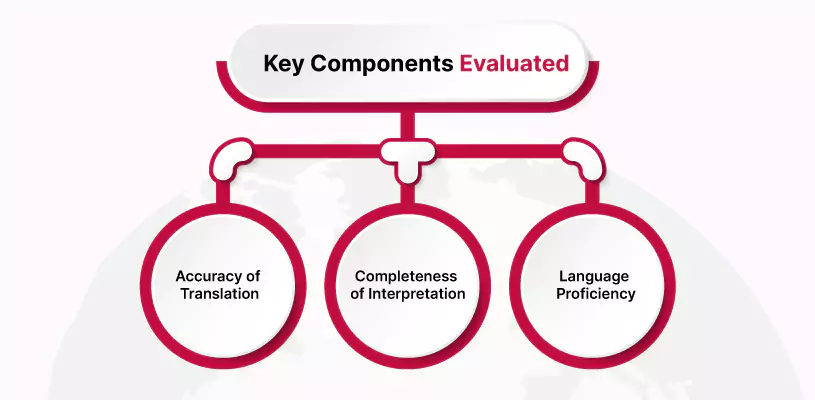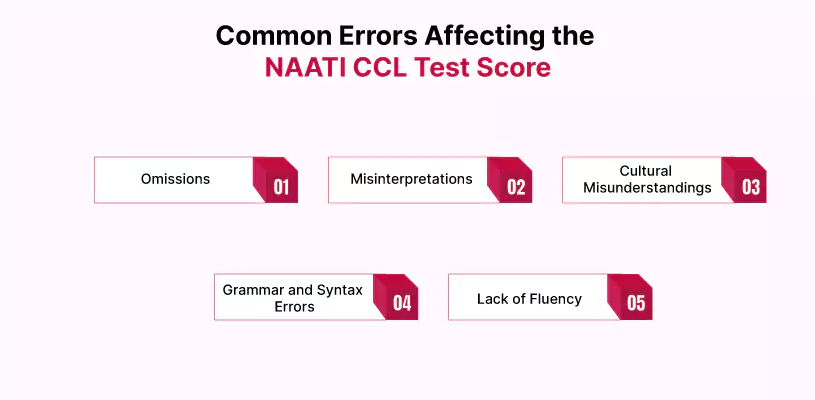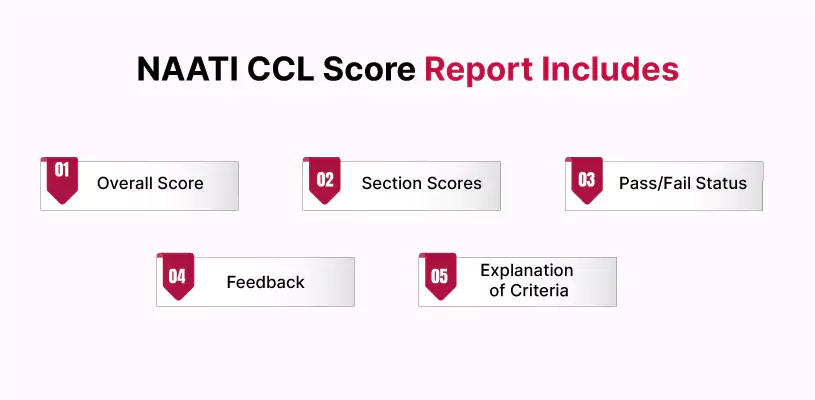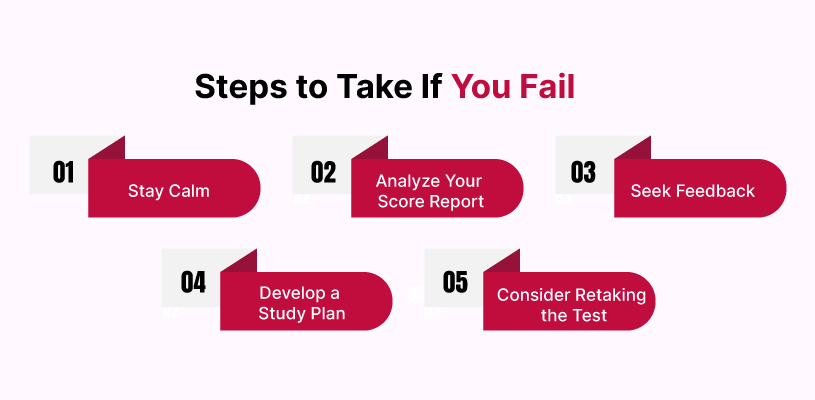
NAATI CCL Test Results: Understanding Scores and Grading
1. Introduction
Overview of NAATI CCL Test Results
The NAATI CCL (Credentialed Community Language) test is a crucial step for individuals seeking to gain extra points towards their Australian immigration application. After taking the test, candidates receive their NAATI CCL Test results, which detail their performance.
Understanding these results is essential for candidates to know where they stand in terms of their language proficiency and how they can improve if necessary. NAATI exam results include the overall score, individual section scores, and any specific feedback provided by the examiners.
How This Guide Can Help You
This guide is structured to provide a comprehensive understanding of the NAATI CCL test results and grading system. It begins by explaining the test structure and naati marking criteria, ensuring you know exactly what is being assessed. Next, it breaks down the score report, helping you interpret each section and understand what your score means.
The guide also offers practical advice on what to do next, whether you passed or need to retake the test, and provides tips for improving your score. With this knowledge, you will be well-equipped to make informed decisions and take confident steps toward achieving your goals.
2. NAATI CCL Test Structure and Scoring
Breakdown of the Test Structure
The NAATI CCL (Credentialed Community Language) test is designed to assess the ability of individuals to understand and translate spoken dialogues from English to a Language Other Than English (LOTE) and vice versa.
The test structure is straightforward, consisting of two main dialogues, each representing a conversation between an English speaker and a LOTE speaker. These dialogues are typically related to real-life scenarios, including healthcare, legal, social services, and community interactions. Each dialogue is divided into segments, which the candidate listens to and then interprets sequentially.
Types of Questions and Dialogues
The test involves listening to recorded dialogues and providing immediate interpretations of each segment. The dialogues can encompass various community settings, such as:
- Healthcare: Conversations between a patient and a doctor or medical staff.
- Legal: Interactions involving legal advice or courtroom scenarios.
- Social Services: Discussions with social workers or community support representatives.
- General Community: Everyday situations like banking, education, and housing.
Each segment requires the candidate to translate the spoken dialogue accurately, reflecting not just the literal meaning but also the context and subtleties of the conversation. This requires a deep understanding of both languages and the cultural nuances associated with them.
Duration of the Test
The NAATI CCL test is relatively short, with each dialogue lasting approximately 8-10 minutes, making the entire test around 20 minutes long. However, candidates need to account for additional time spent on instructions and setting up at the test center.
This concise duration emphasizes the importance of being well-prepared and focused during the test.
Overview of the Scoring System
The NAATI CCL test is scored out of a total of 90 marks, with each dialogue worth 45 marks. To pass the test, candidates must achieve a minimum of 29 out of 45 marks in each dialogue and a total score of at least 63 out of 90. The scoring criteria focus on several key aspects:
- Accuracy: Correctly translating the meaning of each segment.
- Completeness: Ensuring no information is omitted or added during translation.
- Language Proficiency: Demonstrating strong command over both English and the LOTE.
- Cultural Appropriateness: Translating idiomatic expressions and cultural references accurately.
Errors such as misinterpretation, omission, and inappropriate translation can significantly impact the score. Minor errors might only lead to a slight deduction, while major errors that alter the meaning of the dialogue can result in more substantial penalties.
3. Grading Criteria
Detailed Explanation of Grading Criteria
Understanding the grading criteria of the NAATI CCL test is crucial for interpreting your results and improving your performance. The grading system assesses various aspects of your language skills and your ability to accurately and effectively translate and interpret dialogues.
Each section of the test is designed to evaluate specific competencies, and knowing these naati ccl marking criteria can help you focus your preparation and understand your strengths and weaknesses.
Key Components Evaluated

The NAATI CCL test evaluates several key components to determine your overall score. These components include:
- Accuracy of Translation
- Completeness of Interpretation
- Language Proficiency
Accuracy of Translation
Accuracy of translation refers to how precisely you convey the meaning of the original dialogue in the target language. This involves:
- Literal Translation: Ensuring that the literal meaning of each word or phrase is accurately translated without altering the context or significance.
- Contextual Accuracy: Maintaining the context and cultural nuances of the original message to ensure the translated dialogue makes sense in the target language.
- Avoiding Errors: Minimizing translation errors such as misinterpretation of words, incorrect use of phrases, or leaving out important information.
Key Points to Consider:
- Understand both languages deeply to avoid mistranslations.
- Practice translating various types of dialogues to get accustomed to different contexts.
- Review and double-check translations for accuracy.
Completeness of Interpretation
Completeness of interpretation focuses on your ability to deliver a full and coherent translation without omitting any significant details. This involves:
- Thoroughness: Ensuring that every part of the dialogue is interpreted and nothing essential is left out.
- Consistency: Keeping the interpretation consistent throughout the dialogue, maintaining the flow and coherence.
- Detail Orientation: Paying attention to every detail, including minor nuances that can affect the meaning.
Key Points to Consider:
- Practice interpreting long and complex dialogues to improve completeness.
- Develop strategies to remember and convey all parts of the dialogue accurately.
- Use note-taking techniques to keep track of important details.
Language Proficiency
Language proficiency assesses your overall ability to communicate effectively in both languages. This includes:
- Vocabulary Range: Having a wide range of vocabulary in both languages to convey meanings accurately.
- Grammar and Syntax: Using correct grammar and sentence structures to make the interpretation clear and understandable.
- Fluency and Naturalness: Ensuring that your interpretation flows naturally, similar to how a native speaker would communicate.
Key Points to Consider:
- Regularly expand your vocabulary in both languages.
- Practice speaking and writing in both languages to improve fluency.
- Engage in language exchange or professional training to enhance proficiency.
Common Errors and How They Affect Your Score

Common errors can significantly impact your NAATI CCL test score. Identifying and avoiding these errors is essential for success:
- Omissions: Leaving out important parts of the dialogue can lead to incomplete interpretations.
- Misinterpretations: Incorrectly interpreting words or phrases can change the meaning of the dialogue.
- Cultural Misunderstandings: Failing to grasp cultural nuances can result in inaccurate translations.
- Grammar and Syntax Errors: Incorrect grammar and sentence structures can make the interpretation unclear or difficult to understand.
- Lack of Fluency: Hesitations, pauses, or unnatural speech can disrupt the flow and coherence of the interpretation.
Key Points to Consider
- Practice interpreting diverse dialogues to avoid omissions and misinterpretations.
- Develop cultural awareness to accurately interpret dialogues with cultural nuances.
- Focus on improving grammar and fluency through regular practice and professional training.
By understanding and addressing these grading criteria and common errors, you can better prepare for the NAATI CCL test and improve your chances of achieving a high score.
💡 Learn More: Common Mistakes in NAATI CCL Test 🤔🤔👈
4. Score Ranges and What They Mean
Passing Scores
Minimum Score Requirements
To pass the NAATI CCL test, candidates need to achieve a minimum overall score as well as a minimum score in each segment of the test. Generally, the minimum score requirements are set to ensure that the candidate has a proficient level of understanding and translating/interpreting skills in both languages.
For instance, candidates might need to score at least 29 out of 45 in each dialogue and an overall score of at least 63 out of 90 to pass.
How Passing Scores are Determined
Passing scores are determined based on a combination of factors including the accuracy of translation, the ability to convey the intended meaning without distortion, and the proficiency in handling idiomatic and cultural nuances.
The scoring is done by trained assessors who evaluate each dialogue segment separately and then aggregate the scores to determine if the candidate meets the required standards.
Failing Scores
Common Reasons for Failing
Candidates often fail the NAATI CCL test due to several common reasons. These can include:
- Misinterpretation of dialogues leading to significant loss of meaning.
- Incomplete translations where key elements of the dialogue are omitted.
- Poor language proficiency, resulting in grammatically incorrect or awkward translations.
- Lack of understanding of cultural nuances which can alter the intended message.
- Overconfidence leading to insufficient preparation or practice.
Analysis of Low Scores
Low scores in the NAATI CCL test can often be attributed to specific weaknesses. For example, if a candidate scores particularly low in certain sections, it might indicate a lack of proficiency in specific areas such as medical or legal terminology, conversational nuances, or complex sentence structures.
Analyzing low CCL scores can help identify these areas, allowing candidates to focus their future study efforts more effectively.
Score Breakdown
Section-wise Score Analysis
The NAATI CCL test is divided into several sections, each focusing on different types of dialogues and scenarios. A detailed section-wise score analysis helps candidates understand their performance in each part of the test. This breakdown includes:
- Dialogue 1: Analysis of score for the first dialogue, highlighting strengths and areas for improvement.
- Dialogue 2: Analysis of score for the second dialogue, with similar insights.
- Comparison of performance across dialogues to identify consistent patterns or specific areas of weakness.
Understanding Your Strengths and Weaknesses
Understanding the breakdown of your scores helps in recognizing your strengths and weaknesses. If you scored well in dialogues involving everyday conversations but poorly in those involving specialized terminology, it suggests that while your general language skills are strong, you might need to focus on technical vocabulary.
This understanding allows for targeted improvement strategies, ensuring a more comprehensive preparation for any retakes or future language proficiency assessments.
Editor’s Choice: Do You Have What It Takes to Pass the NAATI CCL Exam? 🔔💡👈
5. How to Interpret Your Test Results
Reading Your Score Report

When you receive your NAATI CCL test results, the first step is to carefully read your score report. The report typically includes:
- Overall Score: This is the cumulative score you received in the test.
- Section Scores: Breakdown of your scores in different sections or dialogues.
- Pass/Fail Status: Indicates whether you have met the required threshold to pass.
- Feedback: Specific comments on your performance, highlighting strengths and areas for improvement.
- Explanation of Criteria: Details about the criteria used to evaluate your performance, such as accuracy, fluency, and completeness.
It’s important to go through each part of the report to understand how you performed in various aspects of the test.
Understanding the Feedback
The feedback section of your score report is crucial for identifying what you did well and what needs improvement. This feedback might include:
- Strengths: Positive remarks on areas where you demonstrated strong skills, such as clear pronunciation, accurate translation, and effective communication.
- Weaknesses: Comments on areas where you need improvement, like misinterpretations, incomplete translations, or grammar errors.
- Suggestions: Recommendations for how to improve your performance in future tests. Understanding this feedback helps you pinpoint specific aspects of your language skills that require more practice and attention.
Identifying Areas for Improvement
Based on the feedback and scores, you can identify the specific areas where you need to focus your efforts:
- Common Errors: Look for recurring mistakes in your translations or interpretations.
- Language Proficiency: Determine if there are particular aspects of language proficiency, such as vocabulary or grammar, that need enhancement.
- Test-taking Skills: Assess if issues like time management or test anxiety affected your performance. By identifying these areas, you can create a targeted study plan to address your weaknesses and improve your overall performance.
Comparing Your Score with Benchmarks
To understand your performance relative to other test-takers, compare your score with established benchmarks:
- NAATI CCL Passing Score: Check the minimum passing score for the NAATI CCL test and see how your score measures up.
- Average Scores: If available, compare your scores to average scores of other candidates to gauge where you stand.
- Top Performers: Look at the scores of top performers to understand the level of proficiency required to excel. Comparing your score with these benchmarks helps you set realistic goals for improvement and understand the level of effort needed to achieve a higher score.
✅ Also, Check Out: How NAATI CCL Certification Can Boost Your Career and Life in Australia? 💪🚀🚀
6. Post-Test Actions
After you receive your NAATI CCL test results, it’s essential to take specific actions to understand your performance, learn from the experience, and plan for future attempts if necessary.
Steps to Take After Receiving Your NAATI CCL Test Results
Upon receiving your NAATI CCL test results, follow these steps to evaluate your performance and plan your next actions effectively:
What to Do If You Pass
If you have successfully passed the NAATI CCL test:
- Celebrate: First and foremost, celebrate your achievement as passing the test is a significant milestone towards your goals.
- Review Your Score Report: Carefully review the score report provided by NAATI to understand which areas you performed well in and which areas may need further improvement.
- Update Your Profile: Update your LinkedIn profile, resume, or other relevant documents to reflect your NAATI CCL accreditation.
- Consider Further Accreditation: Depending on your career goals, consider pursuing further NAATI accreditation or exploring opportunities that require NAATI certification.
Steps to Take If You Fail

If you did not pass the NAATI CCL test:
- Stay Calm: Remain calm and avoid being discouraged. Failing the test is a learning opportunity to improve.
- Analyze Your Score Report: Carefully review your score report to identify specific areas where you struggled and need improvement.
- Seek Feedback: Contact NAATI or your test center to understand if there were specific reasons for your performance and seek feedback on areas to focus on for improvement.
- Develop a Study Plan: Create a structured study plan based on your score report and feedback to strengthen your weak areas.
- Consider Retaking the Test: Evaluate whether you want to retake the test and plan for the next available test date.
Importance of Feedback and Continuous Improvement
- Feedback Loop: Feedback from NAATI or your test center is crucial for understanding your strengths and weaknesses.
- Continuous Learning: Use feedback to continuously improve your language skills and test-taking strategies.
- Professional Development: Take advantage of professional training, courses, and resources to enhance your skills between test attempts.
Planning for a Retake
If you decide to retake the NAATI CCL test:
- Evaluate Readiness: Assess your readiness to retake the test based on your preparation and feedback.
- Select a Test Date: Choose a suitable test date that allows ample time for preparation and improvement.
- Revise Your Study Plan: Modify your study plan to address previous weaknesses and incorporate new strategies for success.
- Utilize Resources: Use additional resources such as practice tests, study groups, and online courses to better prepare.
- Stay Motivated: Maintain motivation and confidence throughout your preparation for the retake.
When and How to Retake the Test
- Timing: Decide on the appropriate timing for your retake based on your preparation progress and test availability.
- Registration Process: Follow the registration process outlined by NAATI or your test center to secure your spot for the retake.
- Preparation Tips: Implement effective preparation tips, such as reviewing previous test materials, practicing with new dialogues, and focusing on areas needing improvement.
Tips for Better Preparation
- Structured Study Plan: Develop a structured study plan that includes regular practice sessions and review of test materials.
- Use of Resources: Utilize a variety of resources such as study guides, practice tests, and online forums to enhance your preparation.
- Time Management: Manage your study time effectively to cover all test components adequately.
- Mock Tests: Conduct mock tests to simulate exam conditions and assess your readiness.
- Seek Support: Join study groups or seek guidance from NAATI-accredited trainers to clarify doubts and improve your skills.
7. Appeals and Re-Evaluation for NAATI CCL Test Results
Understanding the Appeal Process
When test-takers receive their NAATI CCL test results, they may feel that their scores do not accurately reflect their performance. In such cases, understanding the appeal process becomes crucial. The appeal process allows candidates to request a review of their test results to ensure fairness and accuracy.
It involves submitting a formal request to NAATI, outlining reasons why the initial scoring may be incorrect or unjustified.
When to Consider an Appeal
Candidates should consider an appeal if they believe there was an error in the scoring process, misinterpretation of their responses, or if they have evidence that their performance was better than reflected in the results. It’s essential to carefully review the score report and consult with trusted advisors or mentors before proceeding with an appeal.
How to File an Appeal
Filing an appeal typically involves completing a formal appeal form provided by NAATI. The form requires detailed information such as personal details, test date, test center location, and specific reasons for the appeal. Candidates may also be required to provide supporting evidence, such as transcripts of the test or additional documentation supporting their claim.
Possible Outcomes of an Appeal
NAATI reviews appeals carefully and considers all evidence submitted by the candidate. Possible outcomes of an appeal include:
- Score Adjustment: If NAATI identifies errors in the initial scoring process, they may adjust the candidate’s score accordingly.
- Confirmation of Initial Score: If NAATI determines that the initial scoring was accurate and fair, the appeal may be rejected, and the initial score remains unchanged.
- Partial Re-evaluation: In some cases, NAATI may conduct a partial re-evaluation of specific sections or responses based on the appeal request.
- Additional Feedback: Candidates may receive additional feedback or clarification regarding their performance, which can be beneficial for future test preparation.
Candidates should be prepared for the appeal process to take some time, as NAATI conducts thorough reviews to ensure transparency and fairness. It’s important to follow NAATI’s guidelines and deadlines for filing appeals to maximize the chances of a successful outcome.
8. Success Stories and Testimonials
Real-life Experiences of Test Takers
This section provides firsthand accounts from individuals who have taken the NAATI CCL test. Test takers share their personal journeys, challenges faced during preparation, and their experiences on test day.
They may discuss strategies that worked for them, insights into the test structure, and how they overcame obstacles to achieve their desired scores. Real-life experiences offer inspiration and practical advice to current and future test takers.
Insights from Successful Candidates
Successful candidates share their perspectives on what contributed to their success in the NAATI CCL test. They provide insights into their preparation methods, study techniques, and approaches to handling different types of test questions.
Insights may include specific tips on improving language proficiency, effective time management strategies during the test, and recommendations for resources that proved beneficial. Their advice helps others understand what it takes to achieve high scores and navigate the test effectively.
Common Traits of High Scorers
This section identifies common characteristics and behaviors shared by candidates who consistently achieve high scores in the NAATI CCL test.
Traits may include strong language skills, thorough preparation habits, ability to interpret nuances in dialogue, effective communication during the test, and resilience in handling challenging scenarios.
Understanding these traits provides aspirants with a benchmark for success and actionable steps to emulate or develop similar attributes in their own preparation.
Lessons Learned from Failures
Learning from failures is a crucial aspect of test preparation. Candidates who did not achieve their desired scores share their experiences and the lessons they gained from their setbacks.
They discuss mistakes made during preparation or the test itself, areas where they underestimated the requirements, and strategies they plan to implement for improvement. Lessons learned may include the importance of thorough practice, addressing specific weaknesses, seeking additional support, and maintaining confidence despite initial setbacks.
Importance of Success Stories and Testimonials
Success stories and testimonials serve several purposes in the context of NAATI CCL test preparation:
- Motivation and Inspiration: They inspire aspirants by demonstrating that success is achievable with dedication and effective strategies.
- Practical Advice: They provide practical tips and insights that can be applied to improve study techniques and test performance.
- Learning from Others’ Experiences: They offer valuable lessons from both successes and failures, helping candidates navigate challenges more effectively.
By incorporating these sections into content related to NAATI CCL test preparation, individuals can gain a deeper understanding of what it takes to succeed, learn from others’ experiences, and approach their own preparation with greater confidence and effectiveness.
Read More: How NAATI CCL Certification Can Boost Your Career and Life in Australia? 🚀🔥😊
9. NAATI CCL Test Results Time: What to Expect
Understanding the NAATI Results Timeline
After completing the NAATI CCL (Credentialed Community Language) test, one of the most anticipated moments is receiving your NAATI result. Typically, candidates can expect to receive their NAATI CCL test results within 8 to 10 weeks from the test date. This timeline allows the assessors to carefully evaluate each candidate’s performance and ensure the accuracy of the grading process.
Factors Influencing the NAATI Results Time
- Test Volume: The number of candidates taking the test at the same time can impact the naati ccl result time. Higher volumes may lead to slightly longer processing times.
- Complexity of the Test: The level of difficulty and the specific languages being tested can also play a role in how quickly the NAATI results are processed.
- Administrative Processes: NAATI follows a thorough administrative process to ensure the results are accurate and fair. This includes multiple stages of evaluation and review.
What to Do While Waiting for Your NAATI CCL Results?
- Stay Calm: Waiting for results can be stressful, but it’s important to stay calm and patient.
- Prepare for Next Steps: Whether you pass or not, consider what your next steps will be. If you pass, think about updating your credentials. If not, you might want to plan a study schedule for a retake.
- Check Your Email Regularly: NAATI will send your results via email, so keep an eye on your inbox and spam folder.
Can You Request a Faster Result?
Currently, NAATI does not offer an expedited results service. All candidates must wait for the standard processing time.
After Receiving Your NAATI Test Result
Once you receive your results, review them carefully. If you have passed, congratulations! If not, analyze the feedback provided, if any, and consider preparing for a retake. Remember that the results are a step toward your larger goal, and staying focused is key.
10. Tips for Improving Your Score
Effective Study Techniques
This section will delve into strategies for scoring high in the naati ccl exam. It will likely cover methods like:
- Active learning techniques (e.g., spaced repetition, practice problems)
- Time management skills for efficient studying
- Mnemonics and memory aids
- Creating a positive and focused study environment
Resources for Practice and Improvement
Here, you’ll find guidance on materials to supplement your studying and identify your weaknesses. Examples of resources might include:
- Practice problems and quizzes
- Textbook solutions manuals
- Online practice tests
- Educational websites and video tutorials
- Flashcards and study guides
Role of Professional Training
This section will discuss the potential benefits of seeking professional guidance. It could cover topics like:
- Enrolling in a preparatory course led by an expert instructor
- Hiring a private tutor for personalized instruction
- Participating in workshops or seminars
Importance of Practice Tests and Mock Exams
This section will emphasize the value of simulating the actual test environment. It will likely explain how practice tests can help you:
- Identify knowledge gaps and areas needing improvement
- Get familiar with the test format and question styles
- Manage your time effectively during the real exam
- Reduce test anxiety by building confidence
By following these tips and utilizing the different resources, you can significantly increase your chances of achieving a high score.
✅ You can find CCL tutorials and other NAATI courses related to it on our website at an affordable price. 🔔🤗🤗
Conclusion
Achieving success in the NAATI CCL test requires a strategic approach, including effective study techniques, utilizing various resources, professional training, and regular practice with mock exams. Understanding your test naati ccl test results and feedback is crucial for identifying areas of improvement and making informed decisions about retakes.
By following the tips provided in this guide and learning from the experiences of successful candidates, you can enhance your language proficiency, boost your confidence, and significantly improve your chances of earning additional points toward your Australian immigration application. Start your preparation today and take a confident step towards achieving your goals.
FAQs
1. What is the full form of NAATI CCL?
The full form of NAATI CCL is “National Accreditation Authority for Translators and Interpreters Credentialed Community Language.” It is a test conducted by NAATI to assess the interpreting skills of individuals in a language other than English.
2. What is the NAATI CCL test?
The NAATI CCL (Credentialed Community Language) test assesses the ability to interpret spoken dialogues between English and a Language Other Than English (LOTE). It is essential for gaining additional points towards an Australian immigration application.
3. What is the structure of the NAATI CCL test?
The test consists of two dialogues, each representing a real-life conversation. Candidates listen to segments of these dialogues and provide immediate interpretations.
4. How is the NAATI CCL test scored?
The test is scored out of 90 marks, with each dialogue worth 45 marks. To pass, candidates must score at least 29 out of 45 in each dialogue and a total score of at least 63 out of 90.
5. What should I do if I fail the NAATI CCL test?
If you fail, review your score report to identify areas for improvement. Seek feedback, develop a structured study plan, and consider retaking the test after adequate preparation.
6. How can I appeal my NAATI CCL test results?
If you believe your results are incorrect, you can file an appeal with NAATI by submitting a formal request outlining the reasons for your appeal. NAATI will review your case and provide a decision.



